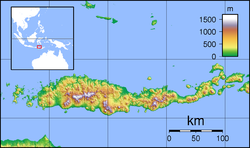1992 Flores earthquake and tsunami
| UTC time | 1992-12-12 05:29:26 |
|---|---|
| ISC event | 257091 |
| USGS-ANSS | ComCat |
| Local date | December 12, 1992 |
| Local time | 13:29 WITA (Indonesia Central Standard Time) |
| Magnitude | 7.8 Mw[1] |
| Depth | 27.7 km (17.2 mi) |
| Epicenter | 8°28′48″S 121°53′46″E / 8.480°S 121.896°E[1] |
| Areas affected | Flores Indonesia |
| Max. intensity | VIII (Severe)[2] |
| Tsunami | Yes |
| Casualties | Approximately 2,500 dead and 500 injured.[1] |
The 1992 Flores earthquake and tsunami occurred on December 12 on the island of Flores in Indonesia. With a magnitude of 7.8 and a maximum Mercalli intensity of VIII (Severe), it was the largest and also the deadliest earthquake in 1992.
Description
The quake hit at 13:29:26 WITA and was followed by several serious aftershocks.[3] At least 2,500 people were killed or missing near Flores, including 1,490 at Maumere and 700 on Babi.[1] More than 500 people were injured and 90,000 were left homeless.[1] Nineteen people were killed and 130 houses were destroyed on Kalaotoa.[1] Damage was assessed at exceeding US$100 million.[3] Approximately 90% of the buildings were destroyed at Maumere, the hardest hit town, by the earthquake and ensuing tsunami while 50% to 80% of the structures on Flores were damaged or destroyed.[1] Electricity in the general area and the port of Maumere was shut down.[3] Maumere's hospital was completely destroyed, and patients were treated in tents.[3] Damage also occurred on Sumba and Alor.[1]
Tsunami
The tsunami on Flores ran inland as far as 300 meters with wave heights of 25 meters.[1]
Relief efforts
The Indonesian government sent rescue and relief missions to earthquake-stricken areas and declared the earthquake a national disaster.[3] The Indonesian air force provided assistance, mostly transporting medicine and clothing.[3] Malaria and influenza rose significantly after the disaster.[3] Babi Island survivors were evacuated since all the houses on the island were demolished.[3] International relief efforts were hindered by the onset of the rainy season.[3]
The Indonesian Government also requested assistance from the international community. Agencies such as the Asian Development Bank in Asia along with the World Bank, the Australian Agency for International Development, the Japanese Overseas Cooperation Fund, and others, made a coordinated effort to support reconstruction. Each agency concentrated on sectors and locations in which it had experience.[4]
References
- ^ a b c d e f g h i Significant Earthquakes of the World in 1992 Archived 2009-09-12 at the Wayback Machine United States Geological Survey
- ^ USGS (December 1, 2008), EXPO-CAT Earthquake Catalog, Version 2007-12, United States Geological Survey
- ^ a b c d e f g h i Reports 1–9 United Nations Department of Humanitarian Affairs
- ^ Some details are provided in Asian Development Bank, Project Performance Audit Report on the Flores Emergency Reconstruction Project, October 2000.
External links
- The International Seismological Centre has a bibliography and/or authoritative data for this event.


